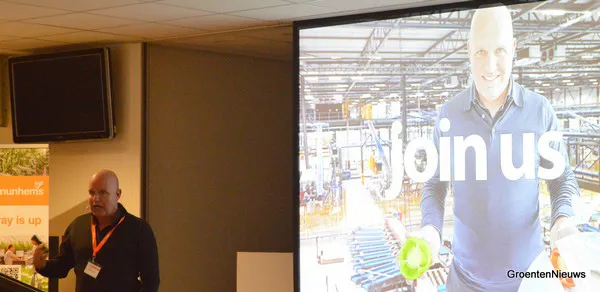Against expectations, 2022 turned out to be a very good year for cucumbers. Dutch growers shifted their crops because of high energy prices, but low prices due to oversupply at certain times did not materialize. Yet the energy crisis did have another adverse effect: the quality of Dutch cucumbers was a lot lower.
Martin Scherpenhuizen, director of the produce trading house of the same name, revealed his worries about Dutch cucumber quality on Wednesday, Nov. 9, during BASF Vegetable Seeds' Cucumber Event in which he gave his view of the cucumber market. "If you deliver such mediocre quality in summer, you don't have any distinctive character and there is no question of a lit winter crop."
 Martin shared his thoughts during the Cucumber Event, organized by BASF Vegetable Seeds on 9 November in the Philips Stadion in Eindhoven.
Martin shared his thoughts during the Cucumber Event, organized by BASF Vegetable Seeds on 9 November in the Philips Stadion in Eindhoven.
High prices
Before the season, fixed prices of 28, 29, and 30 cents per cucumber were agreed in the industry. However, looking back, the unit price turned out to be much higher. Martin has observed prices between 40 and 50 euro cents and feels that this makes it a very good cucumber year financially. Answering a comment from the audience that the cucumbers were still 15 cents too cheap for a profitable crop, Martin said, "As a co-shareholder in a Dutch cucumber company, I also know the numbers on the grower's side. The yields are really good."
Complaints
However, when it came to the product quality, Martin says that he knows there were many more complaints than usual. Cucumbers had a shorter shelf life, and the product quality was overall bad.
Favorable summer
"I don't want to know what would have happened if the weather were disappointing and it were much less 'summery'. The product throughput was really high, and yet the shelf quality was only of a moderate level." According to Martin, this doesn't match the large investments growers are making and the growing techniques that are in place.
Adapted cultivation
Martin does acknowledge there were some mitigating circumstances. The energy crisis is making things difficult for growers. Martin recognizes that and points out that growers who are known to the company as being very strong in terms of quality suddenly turned out quite disappointing this year. He saw growers sometimes opt for two instead of three crops, but from a quality standpoint, he does not approve. "Especially at the end of such a longer crop cycle, the quality gets much worse, resulting in cucumbers that only have a shelf life of three to four days."
Lit cultivation
Many more cucumbers than normal got wasted at Scherpenhuizen because of Mycosphaerella, yellow or crooked fruits, or damage. "Sometimes fruits were, even so, watery that they quickly fell apart," he said. The problems with quality this year mean that quite apart from the energy situation, Martin has a hard head for an lit cucumber crop.
"The prerequisite for a lit crop is that it has to be very good quality. When we succeeded in growing vine tomatoes in the Netherlands, that market started to grow. The Dutch greenhouse sector really has to distinguish itself with reliability and quality." If the Netherlands succeeds in this, then in time, lit cultivation of cucumbers, might be an option," Martin concludes.
